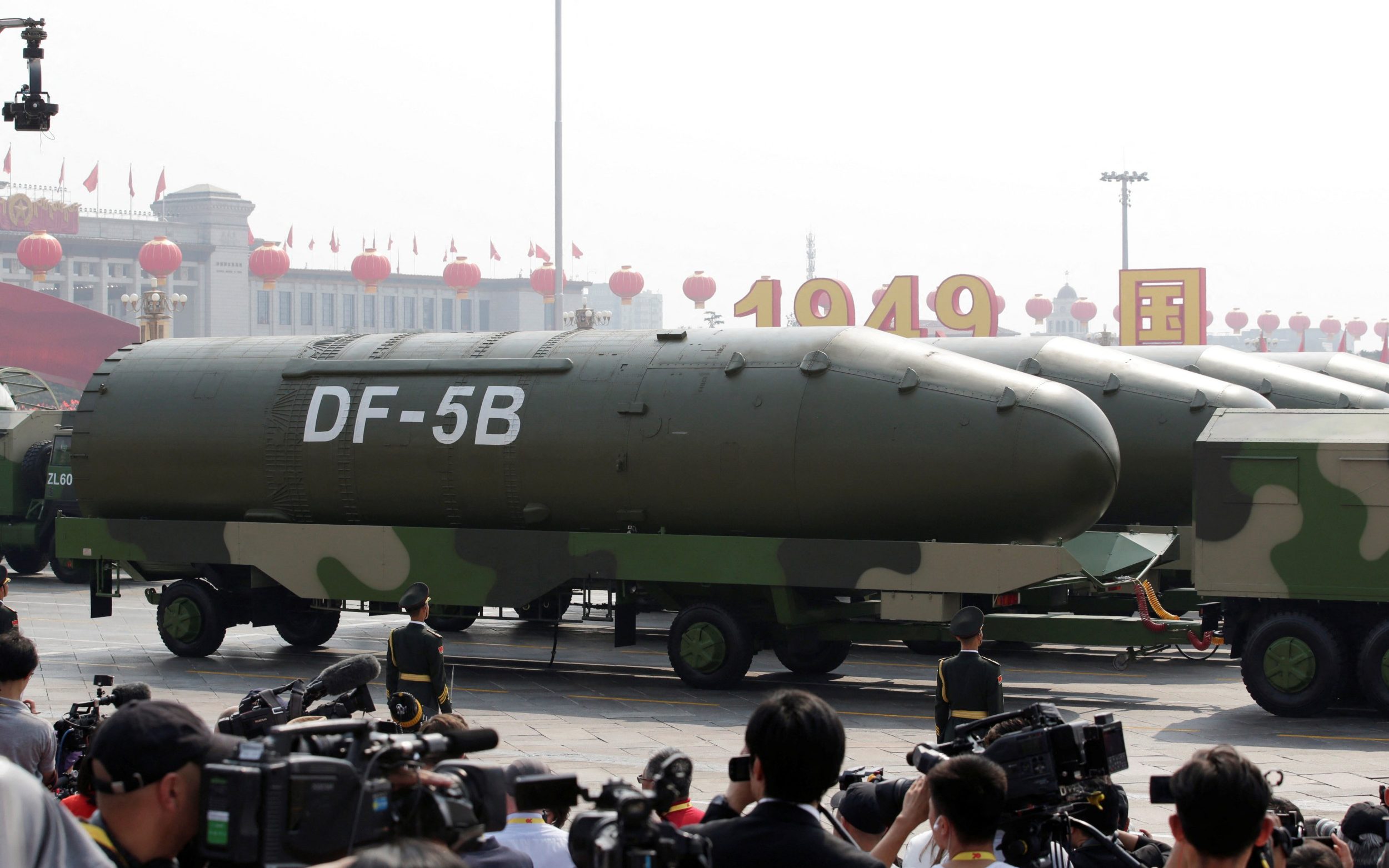
Military vehicles carrying DF-5B intercontinental ballistic missiles
Not long after Deng Xiaoping took charge of saving China from the chaos left by Mao’s demise, Chinese scientists began flocking to Western universities where they were welcomed unconditionally into the heart of the liberal research establishment, and set free to plunder sensitive technical innovation at its source. Now, forty years on, the results have stacked up immensely in favour of the Chinese Communist Party, helping them to develop the cutting-edge military capabilities which underpin China’s increasingly aggressive geostrategic objectives.
This threat has been common knowledge and concern in the UK for decades. Yet successive UK governments have failed to staunch the haemorrhage of priceless technical knowhow from British centres of excellence. Inventions that should have been used to strengthen our own security and that of our allies instead have fuelled the revisionist aggression of what Westminster still persists in calling a “systemic competitor”.
When a competitor which drains British dual use innovation on an industrial scale is rushing to triple its nuclear weapons stockpile, building hypersonic missiles and developing weapons for use in space, perhaps it’s time to abandon such mealy-mouthed euphemisms and come up with some effective deterrents.
As is now well known, on the final day of Xi Jinping’s state visit in 2015 Chancellor George Osborne took him to the National Graphene Institute at Manchester University ‘to learn about the future graphene applications being developed there”. Osborne said that he “wanted to show Xi Jinping what we are capable of in Britain…so that things discovered in Britain could be sold around the world”. China had other ideas. It is now clear that up to one third of Chinese funding to UK universities has links to the Chinese military.
Industrial-scale draining of strategic intellectual property takes place in open sight. Universities can justifiably argue that they have not knowingly aided and abetted the hostile acquisition of sensitive technologies. Given the vast sums invested by China in foreign dual-use technology research and the dearth of strategic UK government funding, it is perhaps understandable if gift horses from Beijing are not looked too closely in the mouth.
The UK government is confronted by a fundamental contradiction between the ideals of free and open academic research and the need to shield some of it from potential hostile exploitation. Even more challenging is the fluid margin between civil and military applications. Such is the pace of technical innovation that today’s new wonderful new discovery may turn out to have uses in future weapons of mass destruction or oppressive surveillance capabilities. China’s “Military-Civil Fusion” policy actively compels Stem researchers to pursue both tracks in parallel. In Britain and much of the West, where liberal freedoms are the norm and there is no such explicit objective and pressure to weaponise everything, the point at which a new technology becomes “sensitive” is extremely hard to define and regulate.
It is comparatively easy for UK security organs to disrupt efforts by terrorists to obtain dangerous technologies, and quite another matter when the beneficiary is a major global economy with whom national policy is to deepen economic co-operation. Thus the UK National Protective Security Authority advises that Chinese laws “may affect the control you have” over research and data shared with “Chinese individuals and organisations”, and leaves academia to choose its own path.
This is no longer sustainable. Our world-class centres of STEM excellence are helping to arm and empower a regime that oppresses its own citizens, supports the likes of Putin and Kim Jong-un and is explicitly bent on using force to replace the rules-based world order with its own authoritarian tyranny. It is high time for Westminster to come up with preventive rules and legislation that stand some chance of stemming the tide.
%n
Sign up to the Front Page newsletter for free: Your essential guide to the day’s agenda from The Telegraph – direct to your inbox seven days a week.
News Related-
Antoine Dupont still hurt by 'injustice' of World Cup loss to Springboks
-
China's New Aircraft Carrier Begins Catapult Testing
-
Aircraft Downed Inside Russia By Patriot System: Ukrainian Air Force
-
“Am I Prog’s Taylor Swift? That’s a debate that could run and run”: why Peter Hammill re-recorded his Enigma-era albums
-
Car With Pro-Russian Fighters Blown Up by Resistance: Exiled Mayor
-
Europe and African nations must find effective common ground in dealing with migration influx
-
Springbok lock opts not to renew contract with URC team
-
Pravin Gordhan’s deathly legacy: A threat to SA’s economic future
-
Antoine Dupont STILL hurt by ‘injustice’ of Rugby World Cup loss to Springboks
-
Rubber stamping NHI Bill will have damaging consequences for SA for generations
-
Inside horrific conditions Hamas hostages suffered including losing 15lbs in 50 days
-
After the Bell: SA’s NHI healthcare disaster starts right here
-
Gupta-linked development land for sale
-
Gary Neville begrudgingly claims brilliant Man Utd midfielder ‘looked like a Man City player’ in Everton mauling
